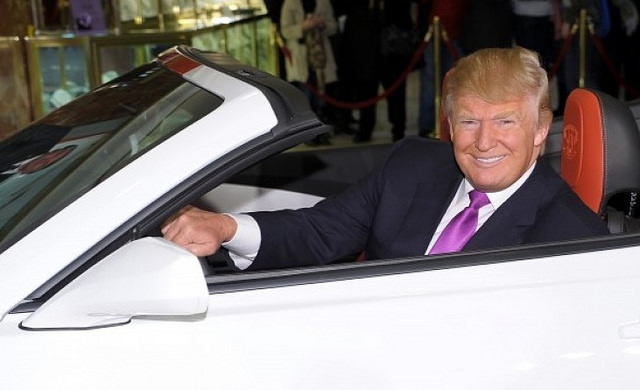[Last year the Chicago Reader launched a weekly transportation column written by Streetsblog Chicago editor John Greenfield. We syndicate a portion of the column on Streetsblog after it comes out online; you can read the remainder on the Reader’s website or in print.]
As it was for the people behind virtually every other progressive cause, the election of Donald Trump was a sad day for those of us who want to see the U.S. move toward a more efficient, healthy, and equitable transportation system.
It seems like a foregone conclusion that, with Republicans in control of both the Oval Office and Congress, our country is going to become only more car dependent. The party's 2016 platform calls for eliminating federal funding for Amtrak, mass transit, bike-share programs, trails, and sidewalks—basically any kind of ground transportation that doesn't involve cars or trucks.
Some leading Democrats have implied that Trump's grand infrastructure plan could be a silver lining to the disastrous election. And some transportation advocates hope that, as a lifelong New Yorker, he might appreciate the importance of subways and city buses.
But within days of winning the election, Trump was already threatening Chicago's roughly $1 billion in overall annual federal funding by promising to cut funds to all "sanctuary cities" that protect undocumented immigrants from deportation. To make matters worse, the president-elect picked road-industry lobbyist Martin Whitmer to lead his "transportation and infrastructure" transition team. And former Reason Foundation analyst Shirley Ybarra, a toll-road champion who has called for defunding transit, is in charge of finding the next U.S. transportation secretary and may be in the running herself.
Under the Obama administration, our city won many federal grants and loans for CTA track and station improvements, as well as bike and pedestrian projects like the Divvy system, the Bloomingdale Trail, and the Chicago Riverwalk extension. But regime change will force advocates to shift from progress to defense, says SRAM Cycling Fund director Randy Neufeld.
"We will move from growing the bike, pedestrian, and transit shares of [transportation funding] to fighting to hang on to eligibility for these modes," Neufeld says. "Treading water is the best we can do. We may drown. Cities will be punished at every opportunity."
This may be why the CTA is hustling to line up about $1.1 billion in federal funding for the $2.1 billion Red/Purple Modernization project before Obama leaves office. For what it's worth, though, CTA officials claim that the rush isn't about fears that Trump will be anti-transit or anti-Chicago, but rather that any presidential administration change could delay the RPM grant by as much as a year.
Despite these threats, some transportation boosters are eyeing at least one of of Trump's campaign promises hopefully. Trump has proposed to spend $1 trillion on infrastructure over the next ten years, and referred to the plan in his victory speech.
"We are going to fix our inner cities and rebuild our highways, bridges, tunnels, airports, schools, hospitals," he said. "We're going to rebuild our infrastructure, which will become, by the way, second to none. And we will put millions of our people to work as we rebuild it."
The need for infrastructure investments is "undeniable," says Metropolitan Planning Council president MarySue Barrett. "The U.S. has underinvested in infrastructure for decades, and new sources of public funding need to be identified."
Some prominent Democrats in Congress, such as House minority leader Nancy Pelosi and New York senator Chuck Schumer, say they're willing to work with Trump on infrastructure. Illinois Democratic representatives Mike Quigley and Dan Lipinski have said that the new president may even have better luck passing a major infrastructure bill than Obama did, because he'll have a Republican-controlled Congress.





